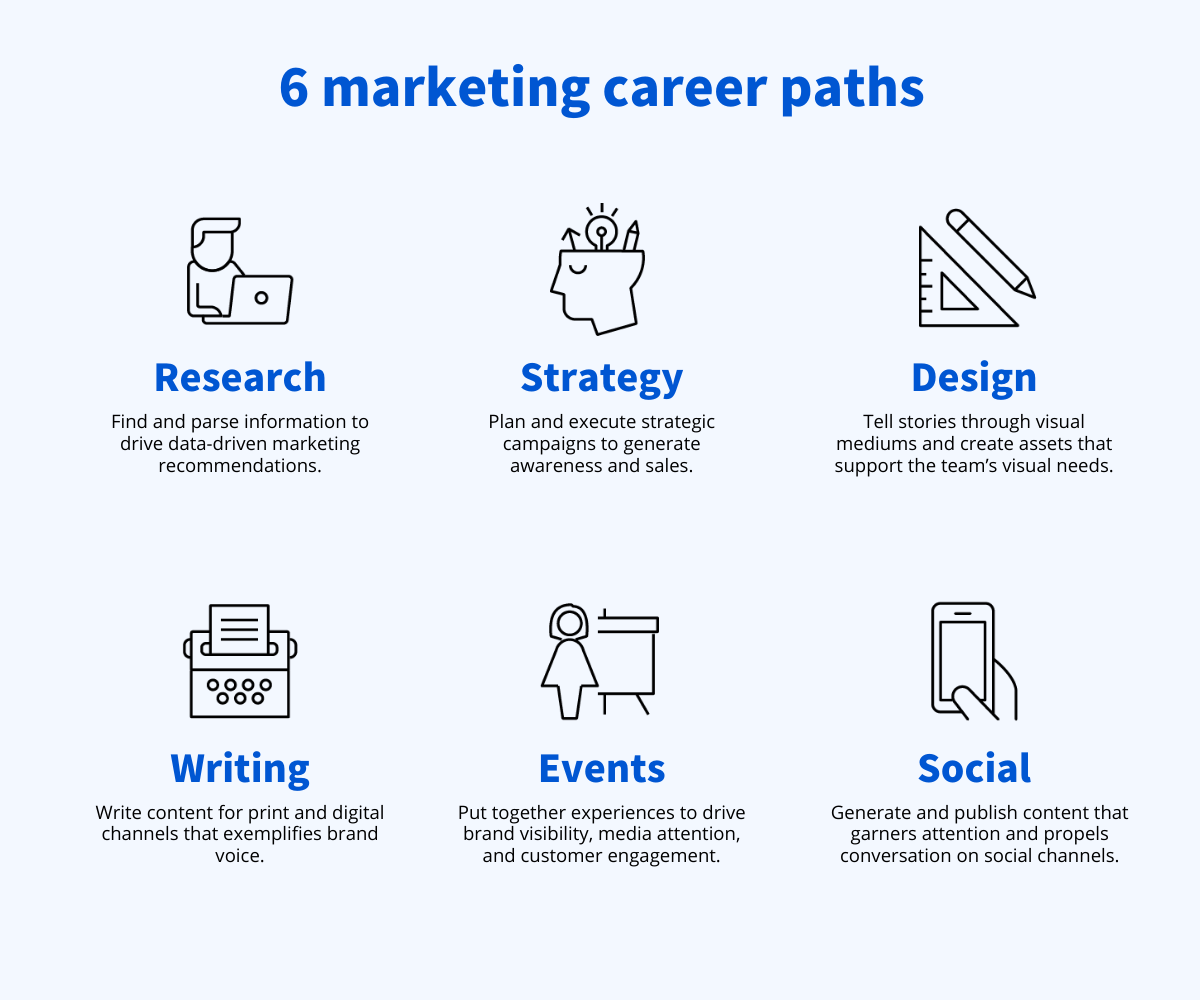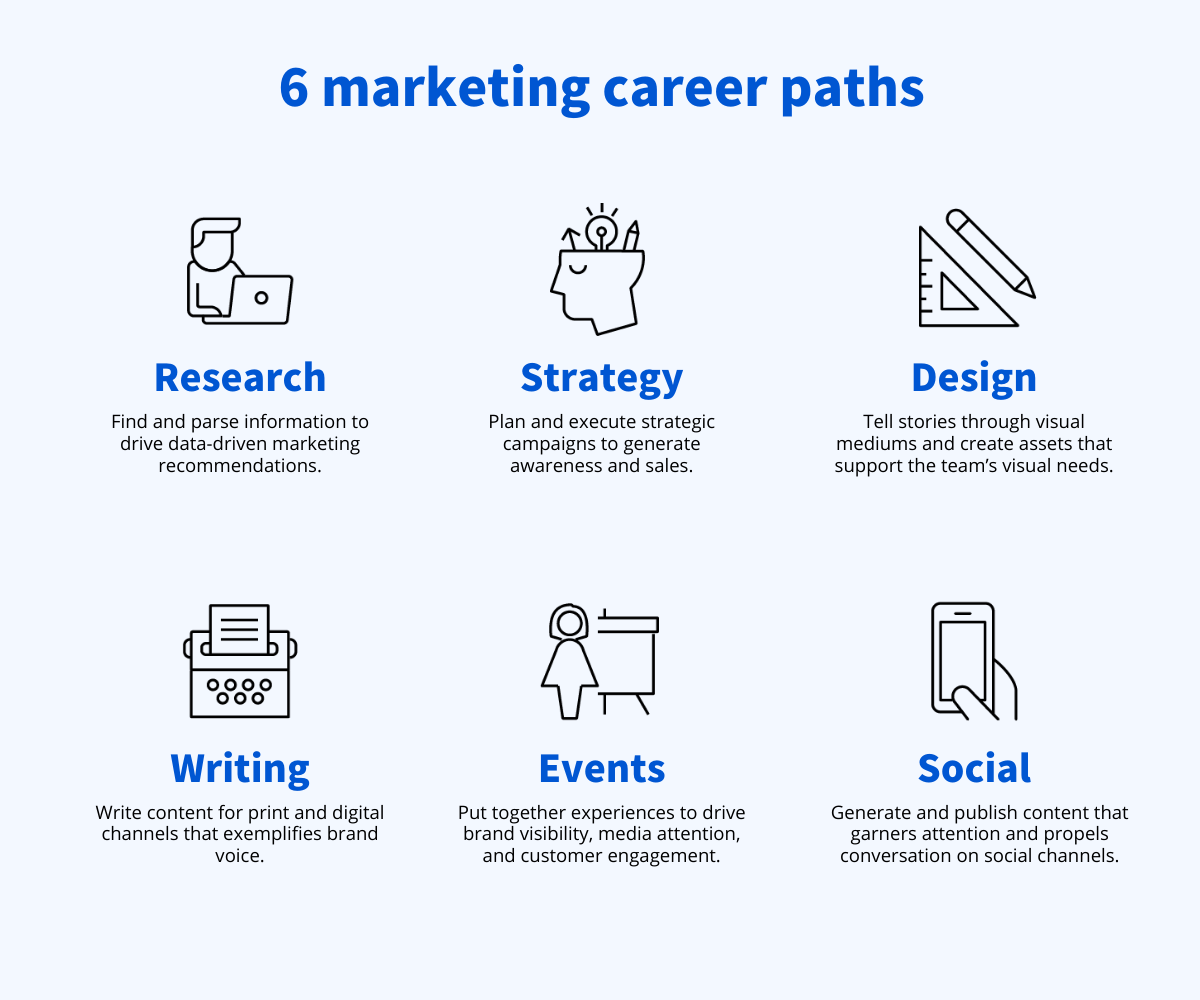| Transferable Skills |
Is marketing worth it as a career?

What Are the Key Benefits of a Career in Marketing?
A career in marketing offers numerous advantages, making it a worthwhile choice for many. Below are some of the key benefits:
- Diverse Opportunities: Marketing spans various industries, from tech to healthcare, offering a wide range of career paths.
- Creativity and Innovation: Professionals in marketing often engage in creative problem-solving and innovative campaigns, making the work dynamic and exciting.
- High Demand: With the rise of digital marketing, companies are constantly seeking skilled marketers to help them stand out in competitive markets.
What Skills Are Essential for Success in Marketing?
To thrive in a marketing career, certain skills are crucial. Here are the most important ones:
- Analytical Thinking: The ability to interpret data and make informed decisions is vital for creating effective marketing strategies.
- Communication Skills: Clear and persuasive communication is essential for conveying brand messages and collaborating with teams.
- Adaptability: Marketing trends evolve rapidly, so being able to adapt to new tools and platforms is key to staying relevant.
What Are the Challenges of a Marketing Career?
While marketing can be rewarding, it also comes with its own set of challenges. Below are some common obstacles:
- High Competition: The field is crowded, and standing out requires constant effort and innovation.
- Pressure to Deliver Results: Marketers often face tight deadlines and high expectations to achieve measurable outcomes.
- Keeping Up with Trends: The fast-paced nature of marketing means professionals must continuously learn and adapt to new technologies and strategies.
How Does Marketing Impact Business Growth?
Marketing plays a critical role in driving business success. Here’s how it contributes to growth:
- Brand Awareness: Effective marketing campaigns increase visibility and recognition, attracting more customers.
- Customer Engagement: Marketing fosters relationships with customers, encouraging loyalty and repeat business.
- Revenue Generation: By identifying and targeting the right audience, marketing directly contributes to sales and profitability.
What Are the Future Trends in Marketing Careers?
The marketing landscape is constantly evolving. Here are some trends shaping the future of marketing careers:
- Digital Transformation: The shift toward online platforms and tools is creating new opportunities in digital marketing.
- Personalization: Consumers expect tailored experiences, driving demand for marketers skilled in data-driven personalization strategies.
- Sustainability Marketing: As environmental concerns grow, brands are focusing on sustainable practices, opening up new avenues for marketers.
What is a career in marketing like?

What Does a Marketing Career Entail?
A career in marketing involves promoting products, services, or brands to target audiences. It requires a mix of creativity, analytical skills, and strategic thinking. Marketers work across various channels, including digital, social media, print, and events, to create campaigns that drive engagement and sales. Key responsibilities include:
- Conducting market research to understand consumer behavior.
- Developing marketing strategies to meet business goals.
- Creating and managing advertising campaigns.
- Analyzing data to measure campaign effectiveness.
- Collaborating with teams like sales, design, and product development.
What Skills Are Essential for a Marketing Career?
To succeed in marketing, professionals need a combination of hard and soft skills. These skills enable them to adapt to the fast-paced and ever-changing nature of the industry. Essential skills include:
- Communication: Clear and persuasive writing and speaking abilities.
- Data analysis: Proficiency in tools like Google Analytics or Excel.
- Creativity: Ability to generate innovative ideas for campaigns.
- Adaptability: Willingness to learn and adjust to new trends.
- Teamwork: Collaboration with cross-functional teams.
What Are the Different Roles in Marketing?
Marketing offers a wide range of roles, each with its own focus and responsibilities. Some of the most common positions include:
- Digital Marketing Specialist: Focuses on online campaigns and SEO.
- Content Marketing Manager: Creates and manages content strategies.
- Social Media Manager: Oversees brand presence on social platforms.
- Brand Manager: Develops and maintains a brand's identity.
- Market Research Analyst: Studies market trends and consumer behavior.
What Are the Challenges in a Marketing Career?
While marketing can be rewarding, it also comes with its own set of challenges. These include:
- Keeping up with rapidly changing technology and trends.
- Balancing creativity with data-driven decision-making.
- Meeting tight deadlines and managing multiple projects.
- Dealing with competition and standing out in crowded markets.
- Measuring the ROI of campaigns accurately.
What Are the Benefits of a Marketing Career?
A career in marketing offers numerous advantages, making it an attractive choice for many professionals. Key benefits include:
- Opportunities for creativity and innovation.
- Exposure to diverse industries and projects.
- High demand for skilled marketers across industries.
- Potential for career growth and leadership roles.
- Ability to see the direct impact of your work on business success.
What are the cons of a career in marketing?

High Pressure and Stress
A career in marketing often involves tight deadlines, high expectations, and the need to deliver measurable results. This can lead to significant stress and pressure, especially in competitive industries.
- Constant need to meet or exceed sales targets and KPIs.
- Pressure to stay ahead of competitors and adapt to rapidly changing market trends.
- Long hours, especially during product launches or campaign rollouts.
Unpredictable Job Stability
Marketing roles can be highly dependent on the economic climate and company performance, making job stability uncertain in some cases.
- Marketing budgets are often the first to be cut during economic downturns.
- Frequent restructuring or layoffs in industries heavily reliant on marketing.
- Dependence on client retention, especially in agency settings.
Constant Need for Adaptation
The marketing field is ever-evolving, requiring professionals to continuously learn and adapt to new tools, platforms, and strategies.
- Keeping up with digital marketing trends like SEO, social media algorithms, and AI tools.
- Need to master new software and analytics platforms regularly.
- Staying relevant in a field where outdated skills can quickly become obsolete.
Work-Life Balance Challenges
Marketing professionals often face difficulties maintaining a healthy work-life balance due to the demanding nature of the job.
- Frequent overtime, especially during campaign launches or peak seasons.
- Expectation to be available outside regular working hours for client needs.
- Difficulty disconnecting from work due to the fast-paced environment.
High Competition and Saturation
The marketing industry is highly competitive, with many professionals vying for the same roles and opportunities.
- Over-saturation of entry-level positions, making it harder to stand out.
- Intense competition for promotions and leadership roles.
- Need to constantly prove value to employers or clients to secure long-term opportunities.
How does it feel to work in marketing?

The Dynamic Nature of Marketing Work
Working in marketing often feels like being in a constant state of motion. The field is highly dynamic, requiring professionals to adapt quickly to new trends, technologies, and consumer behaviors. This ever-changing environment can be both exhilarating and challenging. For instance:
- Creativity is essential, as marketers must continuously develop innovative campaigns to capture audience attention.
- Data analysis plays a critical role, helping to measure the effectiveness of strategies and refine them for better results.
- Collaboration is key, as marketing teams often work closely with other departments like sales, design, and product development.
The Pressure to Deliver Results
Marketing professionals often face significant pressure to deliver measurable results. Whether it's increasing brand awareness, driving sales, or improving customer engagement, the stakes are high. This pressure can manifest in several ways:
- Deadlines are frequent and tight, requiring efficient time management and prioritization.
- Accountability is paramount, as campaigns are closely monitored for their return on investment (ROI).
- Competition within the industry pushes marketers to stay ahead of the curve and outperform rivals.
The Rewards of Seeing Campaigns Succeed
One of the most fulfilling aspects of working in marketing is witnessing the success of a well-executed campaign. This sense of accomplishment can be deeply rewarding. Key elements that contribute to this feeling include:
- Impact on the target audience, such as increased engagement or positive feedback.
- Recognition from peers and superiors for a job well done.
- Growth opportunities that arise from successful projects, leading to career advancement.
The Need for Continuous Learning
Marketing is a field that demands constant learning and skill development. Staying relevant requires keeping up with industry trends and technological advancements. This aspect of the job can be both challenging and rewarding:
- Digital marketing tools and platforms evolve rapidly, necessitating ongoing education.
- Consumer behavior shifts frequently, requiring marketers to stay attuned to new preferences and habits.
- Certifications and training programs are often pursued to enhance expertise and credibility.
The Balance Between Creativity and Strategy
Marketing work often involves striking a delicate balance between creative expression and strategic planning. This duality is a defining characteristic of the profession:
- Creative campaigns must align with the brand's overall strategy and objectives.
- Data-driven decisions are used to guide creative efforts, ensuring they resonate with the target audience.
- Flexibility is required to pivot strategies when initial plans do not yield the desired results.
What skills are essential for a successful career in marketing?
A successful career in marketing requires a combination of creative, analytical, and communication skills. Creativity is crucial for developing innovative campaigns and strategies that capture the audience's attention. Analytical skills are necessary to interpret data, measure campaign performance, and make data-driven decisions. Additionally, strong communication skills are vital for collaborating with teams, presenting ideas, and building relationships with clients or stakeholders. Other important skills include adaptability, problem-solving, and a solid understanding of digital tools and platforms.
What are the typical responsibilities of a marketing professional?
Marketing professionals are responsible for a wide range of tasks depending on their role and industry. Common responsibilities include market research to identify trends and customer needs, developing marketing strategies to promote products or services, and creating content such as social media posts, blogs, or advertisements. They also manage branding efforts, oversee advertising campaigns, and analyze performance metrics to optimize results. Collaboration with sales, design, and product teams is often required to ensure cohesive and effective marketing efforts.
What are the challenges of working in marketing?
Working in marketing can be both rewarding and challenging. One of the main challenges is staying ahead of rapidly changing trends and technologies, which requires continuous learning and adaptation. Marketers often face tight deadlines and high expectations to deliver measurable results. Additionally, balancing creative ideas with budget constraints can be difficult. Another challenge is dealing with competition, as markets are often saturated, making it harder to stand out. Lastly, measuring the return on investment (ROI) of campaigns can be complex and time-consuming.
What career growth opportunities are available in marketing?
Marketing offers a wide range of career growth opportunities across various specializations. Entry-level roles, such as marketing coordinators or assistants, can lead to positions like marketing managers, brand managers, or digital marketing specialists. With experience, professionals can advance to senior roles such as director of marketing or chief marketing officer (CMO). Additionally, marketers can specialize in areas like content marketing, social media marketing, or data analytics. Continuous learning and certifications in emerging tools or strategies can further enhance career prospects.
Ward Marketing
Matthew Ward is a core member of Boston Consulting Group's Marketing, Sales & Pricing (MSP) practice.
Go up
 What other career can I go into with only social media marketing experience?
What other career can I go into with only social media marketing experience? What Are Your Favorite Examples of Good Marketing?
What Are Your Favorite Examples of Good Marketing? I'm Looking to Hire a Marketing Manager, but Want to Avoid Marketing Gurus.
I'm Looking to Hire a Marketing Manager, but Want to Avoid Marketing Gurus.





Articles of interest